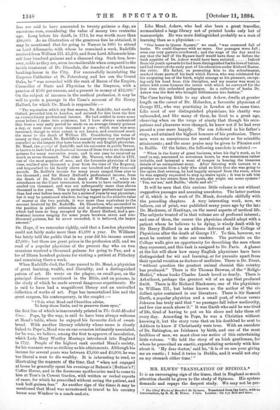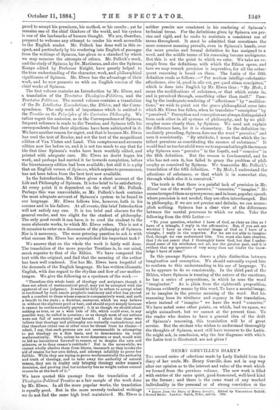ELWES' TRANSLATION OF SPINOZA.* Jr is an encouraging sign of
the times, that in England so much attention should be given to the study of Spinoza. His system demands and repays the deepest study. We may not be pre-
* The Chief Works of Benedict Be Spinoza. Translated from the Latin, with an Introduction, tty /1. H. M. Elves. 2 vols. London: Go re Bell and dons.
pared to accept his premisaes, his method, or his results ; yet he remains one of the chief thinkers of the world, and his system is one of the landmarks of human thought. We are, therefore, prepared to welcome any attempt to render his work accessible to the English reader. Mr. Pollock has done well in this re- spect, and particularly by his rendering into English of passages from the writings of Spinoza, has given as a standard by which we may measure the attempts of others. Mr. Pollock's work, and the study of Spinoza by Dr. Martineau, and also the Spinoza Essays edited by Professor Knight, have greatly helped to the true understanding of the character; work, and philosophical significance of Spinoza. Mr. Elwes has the advantage of their work, and be now presents us with an English version of the chief works of Spinoza.
The first volume contains an Introduction by Mr. Elwes, and a translation of the Tractatus Theologico-Politicus, and the Tractatus Politicus. The second volume contains a translation of the De Intellect us Emendatione, the Ethica, and the Corre- spondence. The only work of importance which is omitted is the Treatise on the Principles of the Cartesian• Philosophy. We rather regret the omission, as in the Correspondence of Spinoza, frequent reference is made to the Treatise, and Spinoza tells his correspondents that their objections have been anticipated in it. We have another reason for regret, and that is because Mr. Elwes has used the text of Broder, and not the text of the magnificent edition of Van Vloten and Land. This sumptuous and accurate edition now lies before us, and it is not too much to say that for the first time Spinoza's works have been worthily edited, and printed with adequate care. Mr. Elwes no doubt began his work, and perhaps had carried it far towards completion, before the bicentennary edition had been available ; but still it is a pity that an English verson of Spinoza, which aspires to permanence, has not been taken from the best text now available.
In the Introduction, Mr. Elwes gives a short account of the Life and Philosophy of Spinoza. It is too brief to be satisfactory. At every point it is dependent on the work of Mr. Pollock.
Perhaps this was unavoidable, as Mr. Pollock's book contains the most adequate account of Spinoza's system to be found in our language. Mr. Elwes follows him, however, both in his success and in his failure. At all events, this brief Introduction will not satisfy any one. It is too brief and obscure for the general reader, and too slight for the student of philosophy.
The only good result it can have, is to send the student to the more elaborate works, to which Mr. Elwes refers. This is not a fit occasion to enter on a discussion of the philosophy of Spinoza. Nor is it necessary. The more prtssing question to ask is with what success Mr. Elwes has accomplished his important task ?
We answer that on the whole the work is fairly well done. The translation of the more popular Treatises is, to our mind, much superior to that of the Ethics. We have compared the text with the original, and find that the meaning of the author has been well rendered. Nor has Mr. Elwes been forgetful of the demands of the English language. He has written idiomatic English, with due regard to the rhythm and flow of our mother- tongue. We give the following as a specimen of the work :—
"Therefore this whole hitsis of theology and scripture, though it does not admit of mathematical proof, may yet be accepted with the approval of our judgment. It would be folly to refuse to accept what is confirmed by such ample prophetic testimony and what has proved such a comfort to those whose reason is comparatively weak, and such a benefit to the state ; a doctrine, moreover, which we may believe in without the slightest peril or hurt, and should reject simply because it cannot be mathematically proved; it is as though we should admit nothing as true, or as a wise rule of life, which could ever, in any possible way, be called in question ; or as though most of our actions . were not full of uncertainty and hazard. I admit that those who believe that theology and philosophy are mutually contradictory, and that therefore either one or other must be thrust from its throne—I admit, I say, that such persons are not unreasonable in attempting to put theology on a firm basis, and to demonstrate its troth mathematically. Who, unless he were desperate or mad, would wish to bid an incontinent farewell to reason, or to despise the arts and sciences, or to deny reason's certitude ? But in the meanwhile, we cannot wholly absolve them from blame, inasmuch as they invoke the aid of reason for her own defeat, and attempt infallibly to prove her fallible. While they are trying to prove mathematically the authority and truth of theology, and to take away the authority of natural
reason, they are in reality only bringing theology under reason's
dominion, and proving that her authority has no weight unless natural reason be at the back of it."
We have quoted this passage from the translation of A Theologico-Political Treatise as a fair sample of the work done
• by Mr. Elwes. In all the more popular works, the translation is equally good. But in the more severely technical writings we do not find the same high level maintained. Mr. Elwes is
neither precise nor consistent in his rendering of Spinoza's technical terms. For the definitions given by Spinoza are pre- cise and rigid, and he seeks to maintain a consistent use of terms throughout. It must be admitted that sometimes the more common meaning prevails, even in Spinoza's hands, over the more precise and formal definition he has assigned to a word, and the middle terms of his reasoning become ambiguous.
But this is not the point to which we refer. We take an ex- ample from the definitions with which the Ethics opens, and here we may remark precision is imperative, for all the subse- quent reasoning is based on them. The Latin of the fifth definition reads as follows :—" Per modum intelligo substantize affectiones, sive id, qnod in alio est, per quod etiam concipitur," which is done into English by Mr. Elwes thus : "By Mode, I mean the modifications of substance, or that which exists in, and is perceived through, something other than itself." Pass- ing by the inadequate rendering of " affectiones " by " modifica- tions," we wish to point out the grave philosophical error into which Mr. Elwes has fallen, when he translates " concipitur "by "perceived." Perception and conception are always distinguished from each other in all systems of philosophy, and by no phil- osopher more clearly than by Spinoza. We need not explain the difference here, for it is elementary. In the definition im- mediately preceding, Spinoza does use the word "perceive," and uses it consistently. "By attribute, I mean that which the in- tellect perceives as constituting the essence of substance." It would lead us too far afield were we to expound at length the reason why Spinoza uses " perceive " in the fourth, and "conceive" in the fifth definition. But the reason is fundamental, and he who has not seen it, has failed to grasp the problem of phil- osophy as conceived by Spinoza. We transcribe Mr. Pollock's translation of the fifth definition. "By Mode, I understand the affections of substance, or that which is in somewhat else, through which also it is conceived."
The truth is that there is a painful lack of precision in Mr. Elwes' use of the words "perceive," "conceive," "imagine." He seems to regard them as synonymous; and in loose, popular, speech. where precision is not needed, they are often interchanged. But in philosophy, if we arc not precise and definite, we can accom- plish nothing. Spinoza has a clear view of the differences between the mental processes to which we refer. Take the following from the 60th Letter :—
" To your question, whether I have of God, as clear an idea as I have of a triangle, I reply in the affirmative. But, if you ask me whether I have as clear a mental image of God as I have of a triangle, I reply in the negative. For we are not able to imagine God, though we can understand him. You most also here observe, that I do not assert that I thoroughly know God, but that I under- stand some of his attributes, not all, nor the greater part, and it is evident that my ignorance of very many does not hinder the know- ledge I have of some."
In this passage Spinoza draws a plain distinction between imagination and conception. We should naturally expect him to conform to this understanding in his use of language. To us he appears to do so consistently. In the third part of the Ethics, where Spinoza is treating of the nature of the emotions,. be has a series of propositions, in which he uses the word " imagin,atur." As is plain from the eighteenth proposition, Spinoza evidently means by this word, To have a mental image, or to imagine in the precise meaning of the word. But his reasoning loses its vividness and cogency in the translation, where instead of " imagine " we have the word "conceive." We have noted some other points, on which, had we space, we might animadvert, but we cannot at the present time. To the reader who desires to have a general idea of the drift of Spinoza's reasoning, this translation will be of great service. Bat the student who wishes to understand thoroughly the thoughts of Spinoza, must still have recourse to the Latin. He might ask, in conclusion, why the few diagrams with which the Latin text is illustrated, are not given ?



































 Previous page
Previous page